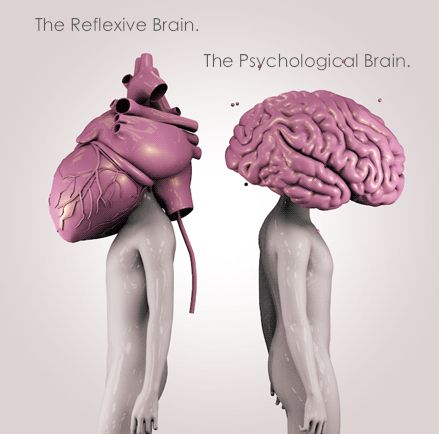Reflexive Brain

In German New Medicine a distinction is made between a psychological conflict and a biological conflict.
What’s the difference you ask?
A psychological conflict involves the mind, a biological conflict involves the automatic or reflexive brain.
The mind ponders, the brain is reflexive. The mind is extrinsic, the brain intrinsic. The mind is acquired, the brain innate. The mind analyzes, the brain knows.
The mind says, “The stove is hot. It would probably be a good idea to pull my hand off of it.” The brain just reflexively pulls it off.” Think reflexive or automatic. No thought, no debate – just protection. The reflexive brain is all about survival, protection and insuring the integrity of its creation.
There is no thought with the reflexive brain, only inborn servitude. In the same way the reflexive or organic brain beats our heart and breathes our lungs it responds to an unanticipated trauma or shock with the same utility.
In the 1998 comedy release, There’s Something about Mary, Woogie (Chris Elliott) breaks out with progressively worsening hives every time he thinks of Mary (Cameron Diaz.) A visit to the dentist and our blood pressure elevates. Our mouth waters over a delicious looking dessert. Anyone who has ever experienced butterflies in the tummy, dry mouth, sweaty palms and heart racing upon arising for the big office presentation understands the validity of the Reflexive Brain and most have experienced these most rudimental illustrations.
When an individual is confronted with an unanticipated trauma, shock, difficulty, dilemma or conundrum which they must overcome in order to insure their biological integrity or survival – yet the trauma or shock cannot, at least at that moment be resolved – nature intercedes and the reflexive brain takes over.
The reflexive brain is in place to take the “weight” of the shock off of the mind and shift it to the body. The “weight” is translated into a compensatory, emergency adaptation response that expresses on the organic or cellular level – what we call disease, that the body is able to run or process over time. This is nature’s way of satisfying Abraham Maslow’s need for self preservation as the translation from the reflexive brain to the body buys time for the possibility of a conflict resolution.
Pulmonary lung cancer provides us with an eloquent demonstration. We find the biological conflict centers around a ‘fear of mortality’ or ‘death fright’, e.g. a cancer diagnosis that is perceived as a death sentence.
From the perspective of the reflexive brain, a death fright is equated with being unable to breathe, GASP. Anyone who has ever received such news will recognize the GASP reflex. As the reflexive brain interprets the biological theme (GASP) of the event, simultaneously the shock impacts a very specific relay switch within the brain, in this case, the brainstem.
The moment the reflexive brain receives that impact, the information is immediately communicated to the corresponding target organ, in this case – the lung, which is placed on emergency stand-by; a total preoccupation with the shock is reflected with the cold hands, insomnia and loss of appetite of the stress response – all mirroring the individuals attempt at resolving the news.
Automatically, the alveolar cells of the lung (air sacs) which regulate breathing, begin to proliferate forming what medicine calls a tumor.
Yet, upon a slight movement of the kaleidoscope, an intelligent survival program emerges – the significance of the additional cells (tumor) serves to increase the available alveolar surface area, lung capacity in order to extract more oxygen to assist the individual through the death fright conflict-shock, thereby optimizing the individuals chance of survival. You see, the reflexive brain is not in fact flawed and fallible – rather it is in place to save our life.
Contrary to the accepted perspective, this multiplication of lung cells is not a pointless process but rather serves a very definite biological purpose. The tumor growth will be in direct correlation to the intensity and duration of the shock. The cellular mitosis will continue until the conflict-shock is resolved.
The reflexive brain is about how our biology interprets the trauma or shock vs. how the mind does. The reflexive brain is in place to insure the integrity of the species, while the mind is in place to ponder, contemplate and recall the fact that the reflexive brain actually insured our survival.
Understood in this new context, disease in essence serves the evolutionary purpose of protecting and preserving our biological integrity.
You may have to “sit” with that one for a bit as we have been taught that illness is random, haphazardly striking it’s victim(s) – we now have an understanding of how the reflexive brain serves nature.
This blog is an educational only blog. The information and services contained herein should not be construed as a diagnosis, treatment, prescription or cure for disease.Those seeking treatment for a specific disease should consult with their physician in order to determine the proper, correct and accepted treatment protocol before using anything that is disclosed on this page. Please visit our Legal page for more information.

